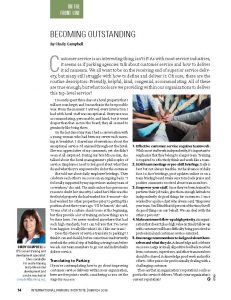 By Cindy Campbell
By Cindy Campbell
Customer service is an interesting thing, isn’t it? As with most service industries, it seems as if parking agencies talk about customer service and how to deliver it ad nauseam. We all want to be on the receiving end of superior service delivery, but many still struggle with how to define and deliver it. Oh sure, there are the routine descriptors: Friendly, helpful, kind, congenial, accommodating. All of these are true enough, but what tools are we providing within our organizations to deliver this top-level service?
I recently spent three days at a hotel property that I will not soon forget, and I mean that in the best possible way. From the moment I arrived, every interaction I had with hotel staff was exceptional. Everyone was accommodating, personable, and kind, but it went deeper than that. Across the board, they all seemed to genuinely like being there.
On the last day of my stay, I had a conversation with a young woman who had been my server each morning at breakfast. I shared my observations about the exceptional service I’d enjoyed throughout the hotel. She was appreciative of my comments, yet she didn’t seem at all surprised. During our brief discussion, she talked about the hotel management’s philosophy of service: Employees need to feel good about what they do and what they’re empowered to do for the customer.
She told me about daily employee briefings. They celebrate each other’s successes on an ongoing basis. “I feel really supported by my supervisors and my team of co-workers,” she said. The smile on her face gave me no reason to doubt her sincerity. I asked her if this was the first hotel property she had worked for. It was not—she had worked for other properties prior to getting this position about three years ago. “I’ll be honest,” she said, “it was a bit of a culture shock to me at the beginning, but they provide a lot of training on how things are to be done here. I’ve never worked anywhere that had such high standards, but I can tell you that I’ve never been happier. I really like what I do. I like our team.”
Does this theory of service translate to parking? I think it can and should, but we sometimes inadvertently overlook the critical step of building a strong team before we ask our team members to go out and individually deliver service.
Translating to Parking
If you’re contemplating how to go about improving customer service delivery within your organization, here are five points worth considering as you set the stage for success:
- Effective customer service requires teamwork. While most staff work independently, it’s important to emphasize that they belong to a larger team. Training is required to effectively think and work like a team.
- Hold team meetings or pre-shift briefings. Daily is best but not always feasible. In the absence of daily face-to-face briefings, post updates online or on a team briefing board. Make sure to include praise and positive comments received about team members.
- Empower your staff. Once they’ve been trained to perform their job tasks, give them enough latitude to independently do good things for customers. I once worked for a police chief who always said, “Empower your team. You’ll find that 98 percent of the time, they’ll do good things on our behalf. We can deal with the other 2 percent.”
- Make customer follow-up a high priority. An organization that doesn’t place high value on timely follow-up with customers will have difficulty being perceived as professional and customer service-oriented.
- Encourage team members to feel good about themselves and what they do. Acknowledge and celebrate successes. Large or small, all positive feedback received from customers, supervisors, and other team members should be shared. Acknowledge good work and noble efforts. Offer praise for professionally dealing with a challenging customer.
They say that an organization’s reputation is only as good as the service it delivers. What is your organization’s current reputation?
CINDY CAMPBELL is IPI’s senior training and development specialist. She is available for onsite training and professional development and can be reached at campbell@parking.org.
TPP-2016-03 Becoming Outstanding
 By Michelle W. Jones, CAE, CMP
By Michelle W. Jones, CAE, CMP
